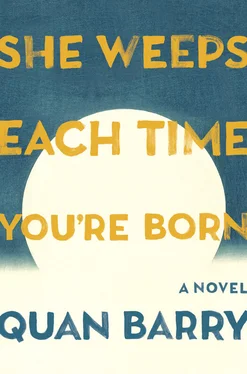The official who entered the room was middle-aged. Comrade Do was clean shaven, his cheeks sunken like most of the northerners. An noticed he had cuffed his left sleeve higher than the right, presumably to show off his new wristwatch. The northern soldiers were buying everything in sight — watches and refrigerators and TVs and radios, motorbikes, even cars, things they had never been allowed to own in the north. Secretly some of them felt betrayed. All these years, decades really, they’d been told that in the south only the top echelons of the corrupt capitalistic swine owned such items and now to come all the way down here only to discover that even middle-class families had gas stoves!
Comrade Do smiled. Overhead the light began to flicker. You want to be a good citizen, don’t you, he asked. Of course. An said it before the comrade had even finished the question. With his left hand Comrade Do slid the yellow legal pad with An’s account on it across the table. The watch flashed on his wrist. An realized the man was left-handed and that he didn’t know that one wears a watch on the opposite wrist.
The new government wanted names. It wanted secrets. It wanted even the littlest things like who took out the trash and on which day of the week. An knew he could never tell enough. It wasn’t in his nature to harm others. He closed his eyes and thought of his children. At five, Son had the face of an old man. Still, he couldn’t bring himself to do it. Somewhere he could hear a door closing, hinges creaking as it blew shut.
There was nothing else to do. He threw himself on the shoals. Said he’d worked with the Americans, that he had little involvement with the Vietnamese. Comrade Do licked the face of his watch a few times and began shining it with his elbow. The Americans left in ’72, he said. What did you do after that? Something about the way the comrade licked the watch, the slowness of his movements, like a cat licking its paws after a kill. An sat back in his chair. He realized everything about his case had already been decided. He didn’t say another word. It was out of his hands. A river sweeping him onward toward wherever it would bear him.
After three nights crammed in a holding cell, he was taken by truck five hours into the highlands. Back in the day the holding cell had been used to keep drunk American soldiers under lock and key until they sobered up. For three nights it housed more than thirty men. Each hour they rotated positions. Three men at a time were allowed to lie down. The rest of them stayed standing, the air by the wall like being smothered alive. At the front of the cell the ventilation was the freshest, though it meant you were mashed up against the iron bars. Men stepped away from the rungs with marks running the length of their faces.
Those first days there was a Buddhist monk in the cell. His orange robe shone like a sunbeam, head smooth as a globe. Somehow he spent three days kneeling. Even when the monk’s eyes were open, An could tell he wasn’t there, all earthly attachments severed. He never saw the monk take any of the paltry food and water they were handed once a day in two wooden bowls for the entire cell. The monk simply knelt by the plastic bucket they relieved themselves in, the bucket with a hairline crack spidering down the side of it, which someone had tried to stop up with gum, urine and waste slowing leaking from the crack, the monk’s robe soiling in the seepage. Time dripping on into more time. The monk didn’t blink when men squatted to defecate right by his head.
At mealtime on the third day the guard read a list of names. An and ten others were called. They were told to prepare their things and leave without eating. None of them had anything to prepare. All their things had been confiscated the first day they came on base. By the time they got to the trucks, there were other prisoners already waiting inside along with two guards with old guns. The guards sat smoking and tossing their butts wherever, the ends still burning faintly, smoke curling off the tips. After an hour one man surreptitiously picked one up and took a drag. When the guard saw the smoke slowing forking out of the man’s nose, he went over to where the man was sitting and hit him savagely in the shoulder with his gun. Then the guard lit a fresh cigarette and placed it in the center of the truck bed. They all sat watching as it burned down. Time burning on into more time. All the men with a cigarette habit squirmed in their seats, the men teased like dogs with pieces of meat. It was only the beginning. The guards didn’t even laugh.
When the prisoners got off the trucks, there was nothing but jungle in every direction. They had to hike several hours. Sometimes it seemed like the guards didn’t know where they were going. Under the canopy the heat felt like a blast furnace, even in the shade of the broad serrated leaves. The first few men through the path were quickly adorned with leeches on their necks, one of them as big as a plum and as dark. The very first man in line hacked at the brush with a machete, then after fifteen minutes he would hand it off to the next man and sink to the back of the line. The path was a trail animals used, scat everywhere, dried and fresh. An didn’t know places like this still existed, miles and miles that had never been bombed. Places where things would still grow.
After a few hours they were told to stop. They were eighty men standing in the jungle. All around them stood a ring of men with guns, some of the guards just boys, their uniforms too big or obviously borrowed. The prisoners were told their job was to clear the land, harvest the trees, build their own shelters, grow their own food, find any mines that might still be present, prove their loyalty, redeem themselves, regain their citizenship, keep an eye out for those among them unable to be rehabilitated, realize the error of their ways.
The first few nights they slept out in the open. Each morning their mosquito bites were so bad they looked like carriers of the pox. An’s unit consisted of twenty men. There was a colonel who refused to do any work, but the others covered for him at first until they didn’t. Each week new trucks would arrive filled with men expecting to stay ten days. Every time the trucks pulled up, An could see the situation reflected in the new arrivals’ horrified faces. How fast a man physically deteriorates. The first month he lost twenty pounds.
The very first structures they were forced to build were a series of small boxes barely big enough for a man to stand up in. The first man put in the box was a former student leader named Nam. But I protested against Diem, Nam said over and over as they dragged him in one morning. Don’t listen to him, the guard said. He is a traitor who has been to the great enemy. I have been to the United States, Nam conceded, but to lecture against the war. He said he’d been flown to America by anti-war organizations to speak with students in a place called Berkeley, another called Madison. The guards got his arms in and closed the door. A piece of wood shot through a bolt in the front to keep it closed. All morning in the hot sun they could hear Nam’s cries at first like a small child, then like a wounded animal, and then nothing. The guards made a show of taking him out that night when the others came back from clearing the jungle. When they opened the door, he fell on his face, his body shaking, mouth white with foam. Two men were ordered to carry him over to the spot where they all slept out in the open. By morning he was dead. Why, someone whispered as they walked into the jungle at the start of the day. To show us the power of the box, someone said. Why him, someone asked. Because he was weak and they didn’t need him. No, someone else said. The man speaking carried a length of rope coiled around his arm, his voice a deep baritone. This is how he was meant to serve, the man said. Nobody said anything. And with that, they began to suspect one another.
Читать дальше












